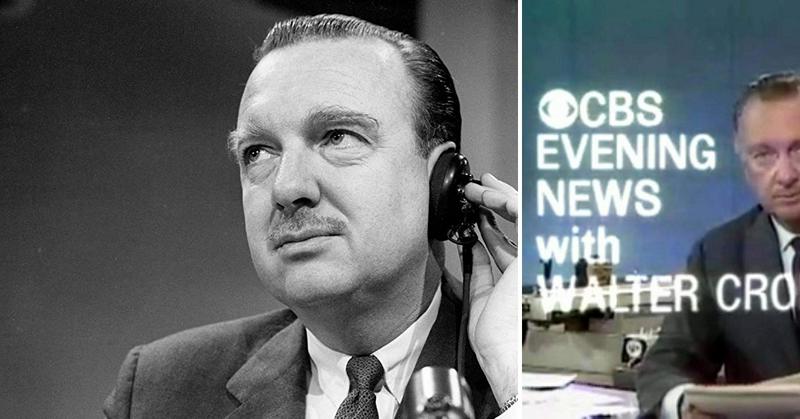Before Fake News, Walter Cronkite Was 'Most Trusted Man In America'
By | August 8, 2019

Once there was a newsman named Walter Cronkite. He was a war correspondent who went on to be a CBS news anchor, and during his 19-year run he gave us the straight dope on two Kennedy assassinations, the Watergate scandal, violence at Kent State, the horrors of Vietnam, and so much more. In today's atmosphere of media partisanship and fake news it seems a bygone notion, but Cronkite was known as "the most trusted man in America."
Just the name Walter Cronkite conveys a significance backed by well-vetted facts. If Cronkite were alive today, he would tearfully lament the political tribalism that permeates through news organizations. In his day, truth mattered above all else. Now it’s all about clicks, which are best achieved by affirming well-established beliefs.
'Simple Basic Journalism'

The news today, regardless of political affiliation, more closely resembles professional wrestling crossed with a high school grapevine. Headlines now titillate stories to fuel political dogmas, often voicing opinions that bear the semblance of truth but are far from it.
No one said it better than Cronkite, the CBS Evening News anchor from 1962 to '81: “We all have our likes and our dislikes. But... when we're doing news, it is our duty to be sure that we do not permit our prejudices to show. That is simply basic journalism.” Sadly that’s a rather quaint concept today.
Walter Cronkite Was No Desk Jockey

The wisdom of Walter Cronkite:
The perils of duck hunting are great - especially for the duck.
Today, more and more reporters never leave the comforts of their desks. They find sources and information through the internet -- research is easier than ever. But the lack of real-world experience has put perspective in short supply, and the public's interest in reading things that simply confirm their own views has put news outlets in a tough spot. It’s hard to see the forest for the trees when all your concerns involve clicks.
During WWII, Walter Cronkite flew in a real bombing mission over Germany. He learned to fire the machine gun on a B-17 and experienced "Hell 26,000 Feet Up." This mission wasn’t a media puff story either. The New York Post’s Robert P. Post died when his plane was shot down on the same mission.
Danger And Commitment To The News

Cronkite's view:
I think it'd be great if the evening news broadcast, for instance, were unsponsored and unrated.
Cronkite also witnessed D-day from above, covered Operation Market after landing by paraglider with paratroopers, and witnessed the Battle of the Bulge. In 1945, with the war over, Cronkite didn't stop reporting -- he kept his press pass and covered the Nuremberg Trials.
News Over Noise

Cronkite's job description:
Our job is only to hold up the mirror -- to tell and show the public what has happened.
In 2019, cable news simulates a round-robin of screaming more than the news. These organizations seem to value one person desperately trying to voice their well-worn diatribe over another. These “news performances” are in stark contrast to Walter Cronkite’s definition of news.
Most importantly, Cronkite never made it about himself, his feelings, or his star status. "Helping set the day's agenda and deciding what we used and editing it, that was a journalistic high point. I liked reporting as well. Just doing the news -- the live performance -- wasn't important. Working on the desk was."
Objectivity -- What A Concept

Cronkite's political affiliation:
I have never voted a party line. I vote on the individual and the issues.
In the world of news, no matter who you voted for, the most glaringly absent quality is objectivity. It’s telling that Walter Cronkite, “The most trusted man in America,” held objectivity as the most vital quality for journalists.
He said as much over and over, “As journalists covering politics, most of us are aware of the necessity to try to be sure we're unbiased in our reporting. That's one of the fundamentals of good journalism.”
It’s almost comical to think of today’s broadcasters as you read this quote, “On television, I tried to absolutely hew to the middle of the road and not show any prejudice or bias in any way.”
But for Cronkite, that was the deal -- or, to quote his famous sign-off line, "that’s the way it is."
Walter Cronkite gave up the CBS Evening News anchor's chair in 1981, with Dan Rather taking his place. Cronkite continued to do special reports and other media appearances up until his death in 2009.
